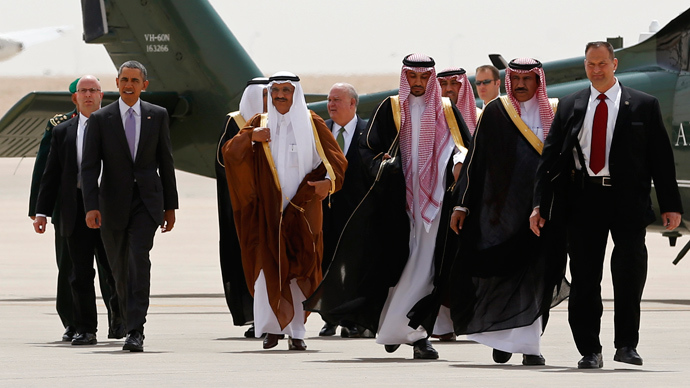You do not have to be a Middle East geopolitical expert to see how recent events are changing the course of Saudi Arabia’s future. The Kingdom’s royal family does not fear its imminent demise, but it has significant problems that jeopardize its stability if they are not addressed. The recent death of King Abdullah, significant decreases in oil prices, regional conflicts in Yemen, Syria and Iraq, the constant influence of Iran, and the latest threat from ISIS are forcing the House of Saud to accelerate its pace of reforms. Internal and external threats—perceived or real—have caused the Royal Family to reconsider its support and funding for jihadists groups operating as proxies for the dynasty, soften its stance on dissidents, and reevaluate its relationship with Wahhabi clerics who legitimize the Royal Family.
 Significant changes within the royal family have already become evident. Within days of taking over, King Salman dispelled any questions regarding succession by elevating, as expected, Deputy Crown Prince Moqren to king-in-waiting and then, in a surprising move, making Prince Mohammed bin Nayef second in line to the throne. Additionally, through a series of decrees, King Salman made significant changes to his Cabinet, National Security Council, and Intelligence leadership, which reflect a greater emphasis on internal and external security. Prince Bandar bin Sultan was removed from his posts as Secretary General of the National Security Council and adviser to the king. Prince Khalid bin Bandar bin Abdul Aziz al-Saud was relieved of his post as Chief of General Intelligence and replaced by General Khalid bin Ali bin Abdullah al-Humaidan. And, King Salman appointed his son, Prince Mohammed bin Salman, as Minister of Defense. These changes are, in part, to counter the proliferation of ISIS, the increased Shia dissident activity in the Eastern Province, and the increase in attacks on foreigners throughout the Kingdom.
Significant changes within the royal family have already become evident. Within days of taking over, King Salman dispelled any questions regarding succession by elevating, as expected, Deputy Crown Prince Moqren to king-in-waiting and then, in a surprising move, making Prince Mohammed bin Nayef second in line to the throne. Additionally, through a series of decrees, King Salman made significant changes to his Cabinet, National Security Council, and Intelligence leadership, which reflect a greater emphasis on internal and external security. Prince Bandar bin Sultan was removed from his posts as Secretary General of the National Security Council and adviser to the king. Prince Khalid bin Bandar bin Abdul Aziz al-Saud was relieved of his post as Chief of General Intelligence and replaced by General Khalid bin Ali bin Abdullah al-Humaidan. And, King Salman appointed his son, Prince Mohammed bin Salman, as Minister of Defense. These changes are, in part, to counter the proliferation of ISIS, the increased Shia dissident activity in the Eastern Province, and the increase in attacks on foreigners throughout the Kingdom.
Changes are also taking place within Saudi society. King Salman quickly issued a decree pardoning what are described as “public rights” prisoners. In the future, these could include pardons for Mimr al-Nimr and Raif Badawi. Mimr is a Shia cleric sentenced to death by crucifixion for seeking foreign meddling, disobeying its rulers, and taking up arms against security forces. Badawi is a prominent blogger who was sentenced to 1,000 lashes and 10 years in prison for insulting Islam. Both are in custody, in poor health, and if anything were to happen to them, the Royal Family can expect to experience significant internal and international condemnation. This past Friday, Suad al-Shammary, a rights activist and lawyer who worked with Mr. Badawi on his blog, was released after being held for three months over comments she made on Twitter. In a recent report by Amnesty International, Saudi officials recently approached public rights prisoners unofficially inquiring about their thoughts on potential conditional pardons. In an effort to appease its citizens, the new King granted two months of basic salary to all Saudi government civil and military employees with similar bonuses going to students and retirees.
Riyadh still maintains the upper-hand vis-à-vis U.S. foreign policy in the Middle East. However, due to internal and regional dynamics, its status in the Gulf region is weakening. In the past, members of the Royal Family would publically support U.S. foreign policy and military operations, while at the same time provide funding to individuals, groups and organizations to support its religious ideology. The Saudi family can no longer play both sides of the fence and must choose a coherent and consistent approach in the war against ISIS and Islamist extremism. Saudi Arabia is relatively stable and regime change is unlikely. However, the level of unrest in the Middle East, and the ability for the Saudi Royal Family to keep the unrest outside its borders, is lessening. The Kingdom’s leadership needs to find effective ways to appease the powerful clerics, modernize the strain of Islam practiced, fight and subdue the radicals within and without its borders, and do this all during a time of low oil prices. It is not an easy task, but the House of Saud needs to walk this tight rope if it wants to maintain stability, its regional hegemony, and its own control on power.

